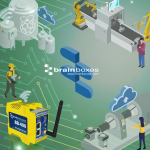What is IIoT?
To put it simply; the Internet of Things or ‘IoT’ extends the capabilities of the internet to objects and devices, making them able to send, receive and gather data. In an industrial context (IIoT) the concept is the same; devices associated with manufacturing such as sensors, machines, and generators are networked together with internet applications for the purposes of control, management, and monitoring. Why is IIoT important?
Providing devices with the ability to collect information from their environment gives businesses better insight into data. Better insights allow more efficient monitoring and control which in turn generates cost savings.
Secure Opportunities
More than 80% of senior executives see IoT as critical to their business1
IIoT brings a world of opportunities to industry. Networking machines, sensors and control systems together with industrial connectivity devices enables the optimisation of production lines, rapid response to demand, and efficient monitoring.
- Improved efficiency
- Increased productivity
- Minimized downtime
- Maximised margins
Your IIoT Journey
Integrating this new wave of connected technology can seem like a headache, and an expensive one at that. Whilst futuristic tech headlines are often drawn by huge conglomerates, it’s fortunately the reality that the smart sensors and powerful analytic tools available to the largest multinationals can be just as easily (and economically) dropped into the workflow of any small or medium sized enterprise. The tools and resources are often already there – they just need mobilising and utilising in new ways.
Retrofitting existing setups with smart solutions, particularly out-of-the-box devices, is the most effective way to disrupt the cost of implementing IIoT.
The ability to send real-time data across expansive spaces makes optimisation of any environment possible.
In their vast warehouse in Nuneaton UK, RS Components have a system of 20 cranes at work over half a mile away from the monitoring panel. By installing Brainboxes remote I/O modules to the panel, they were able to harness IIoT and send usable data concerning the cranes’ processes, productivity, and faults, to screens on the warehouse floor, supervisor’s offices, and onto a mobile app. Not only does this make vital information accessible to every team member, but analysis of the data allows RS to identify trends in productivity and adjust their processes accordingly.
With the right adaptations, even the most extreme environments can utilise IIoT. Oxford University’s Global Jet Watch team has a network of 5 observatories around the globe. Ensuring one of their telescopes is in darkness at any given time is vital in collecting the right dark matter data for their research, hence the stations’ strategic distribution in longitude.
To collect data on the high-speed plasma jets that are squirted out of black holes, the Global Jet Watch team rely on IIoT-ready modules. Brainboxes devices can withstand the harsh temperatures to reliably facilitate integration between the control panel in Oxford, UK and the observatories thousands of miles away.
“What massively helps digital signal infrastructure are the products made by Brainboxes. We use their Ethernet switches and Ethernet to serial converters…utterly rugged products they survive extremely high temperatures such as we have in rural Southern India” – Katharine Blundell OBE, Global Jet Watch
As the Industrial Internet of Things is embraced by more sectors, it’s gradually becoming easier to visualise the 4th Industrial Revolution and what exactly it will look like. A far departure from WiFi enabled floss dispensers and novelty connected underwear, inexpensive IIoT solutions can provide immediate and measurable benefits to any business right now.
Tel: (0151) 220 2500








